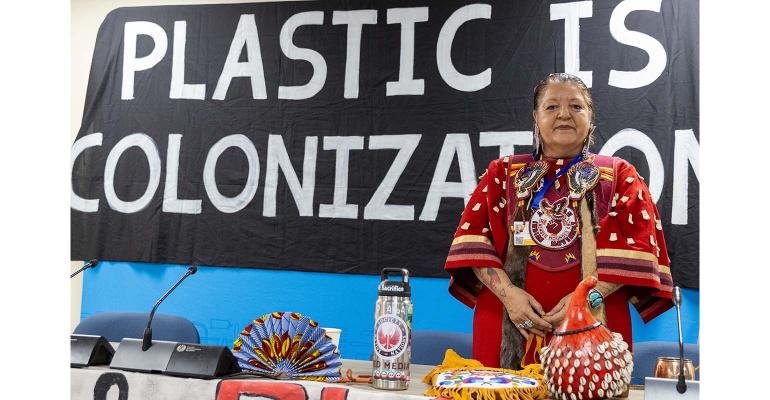Latest Global Plastics Treaty Talks End Largely Where They Began
INC-3 concluded its work in Nairobi on Nov. 18 divided on whether management of plastic pollution would be best served by a bottom-up or top-down approach.
November 26, 2023

The stage is set for the fourth Intergovernmental Negotiating Committee (INC-4) toward a global plastics treaty after INC-3 concluded its work Sunday evening in Nairobi. A week of intense, complex negotiations produced a voluminous next draft for consideration.
Delegates mandated the INC Secretariat to compile a revised "zero draft" text by Dec. 31, 2023.
Three contact groups pored over dozens of member submissions and statements this week in addressing the six parts of the zero draft document released after INC-2. Their summary reports, compiling input from member states, swelled the initial draft to three times its original size, one watchdog noted. The next document to be considered will be filled with options for addressing topics ranging from sustainable development, production of primary polymers, and chemicals of concern to product design, “problematic and avoidable plastics,” and “vulnerable groups” (waste pickers, women, youth).
And, just as at the start of the Nov. 13 to 19 negotiations, the primary divide among member states remains: Whether to manage plastics pollution from the “bottom up” — making nations responsible for environmental cleanup and costs — or mandate a stricter approach that clearly limits or bans production of “problematic” and hard-to-recycle plastics.
Stage set for INC-4 in Ottawa
This week’s talks forged the basis of negotiations during INC-4 in Ottawa from April 21 to 30, 2024. Talks for INC-5 in Busan, South Korea, were announced for Nov. 25 to Dec. 1, 2024. Also, INC-4 will see a new INC chair presiding: Luis Vayas Valdivieso of Ecuador.
The United Nations Environment Program (UNEP) seeks to develop a legally binding instrument regulating plastic pollution worldwide by the end of 2024, after resolving in March 2022 to pursue the effort.
Considering a gender perspective
The staggering array of issues being discussed ranges from the technical and financial aspects of meeting the mandate of a globally binding plastics treaty to whether the final instrument “should also contain a gender perspective, promote decent work throughout the value chain of plastics, and be science-based.”
As Sunday evening’s plenary got under way, with contact group 3 still working, the order of business turned to other agenda items, including the election of officers. Delegates elected Vayas Valdivieso as the new INC chair for INC-4, with outgoing chair Gustavo Meza-Cuadra and Harry Liiv of Estonia elected to serve as vice chairs.
“We all know that plastic pollution is scientifically proven to have a huge adverse, and I will say scary, impact to the environment and to human health," said Valdivieso. "We have a big responsibility on our shoulders. We are not here to end all plastics, but we are here to end plastic pollution. As (with) any negotiation, we will face challenges.“
Concluded UNEP Executive Director Inger Andersen: “When I opened this august gathering Monday . . . I recalled the UNEP resolution, which spoke to . . . the full lifecycle of plastic, and I would like to say that you have all honored that in what you have now agreed. You have agreed that a revised draft will be available for negotiators as a starting point and a basis for the next round. This was by no means easy, but it is a significant feat.”
Read the compiled contact group reports.
Watch INC-3 sessions, as well as sessions from INC-1 and INC-2.
Read the INC-3 report.
INC-3 working documents can be found on the UNEP website.
About the Author(s)
You May Also Like


